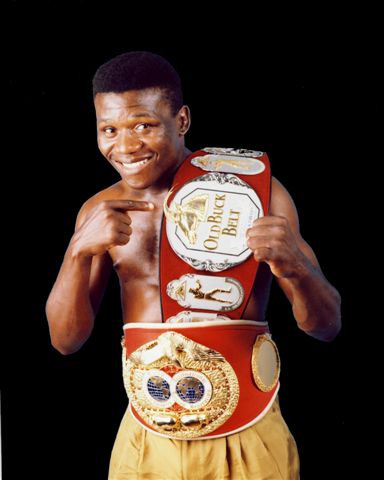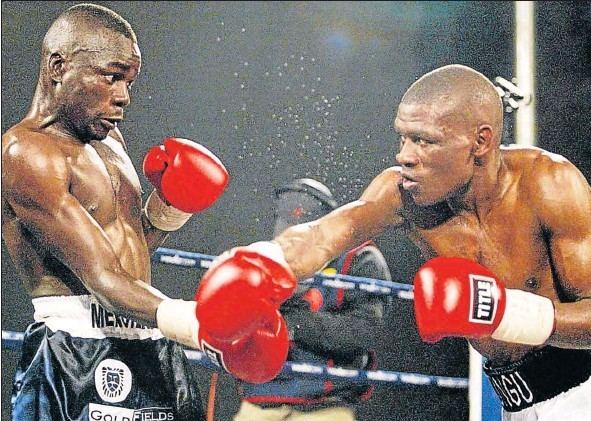Vuyani Bungu’s recent nomination for induction into the International Boxing Hall of Fame is worthy and long overdue, writes Ron Jackson.
After his long overdue nomination last week, there’s no doubt that Vuyani “The Beast” Bungu deserves to be in the International Boxing Hall of Fame.
Bungu won more King Korn/Boxing World awards than any other fighter. He was voted SA Boxer of the Year in 1994, 1996, 1997 and 1998.
His fights against Jesus Salud and Kennedy McKinney were named Fight of the Year in 1996 and 1997. He also received a special award in 1995.
Only two South Africans, Stan Christodoulou and Brian Mitchell, are in the International Boxing Hall of Fame. Bungu deserves to be the third.
This brilliant fighter was born in Duncan Village near East London on February 26, 1967.
His family moved to Mdantsane shortly afterwards, where many residents came to know him as “The Beast” and where he developed into one of the best boxers to come out of South Africa.
It is not clear why he was nicknamed “The Beast” because he never fought like a beast and never acted like one outside the ring.
One of six children who grew up poor, little Vuyani sometimes went to school without anything to eat.
During an interview on the SuperSport programme Punchline, he told how he would take a plastic bag with a stone inside to school, where he would turn his back on his friends and pretend to eat bread from the bag.
His father suffered from asthma and his mother, Lilian, who was employed as a domestic, just managed to keep the family of eight alive in their two-roomed house, without water or electricity.
Vuyani learnt to box in a gymnasium at school in Mdantsane. There was only one punch bag, but the trainer was Mzimasi Mnguni.
Mnguni was his manager and trainer throughout his career. He bought Bungu his first suit and gave him money to buy food for his family.
Their relationship turned sour about 20 years later when it was reported that Bungu, who had allegedly earned more than R10-million between 1994 and 2005, was broke.
He denied that he had made so much money and blamed the taxman and Mnguni for his financial problems.
It was claimed that Bungu sometimes fought without signing contracts and not knowing how much he would be paid. But it was also reported that he lived lavishly.
After building up an impressive amateur record of 77 wins against 8 losses (some reports said he won 108 and lost 20) Bungu made his professional debut on April 26, 1987. He knocked out Xolela Makhuluma in the fourth round in Mdantsane and was paid R34.
He had left the Nyameko High School in the ninth grade to pursue his boxing career.
After winning four of his next five fights inside the distance, Bungu won the Cape Province junior featherweight title when he outpointed Sexon Ngqayimbana over 10 rounds in June 1988.
He won his next six fights, including five defences of the Cape title, before suffering his first defeat. It came in August 1989 when he challenged hard-hitting Fransie Badenhorst for the SA featherweight title in Cape Town.
Bungu was knocked down three times but fought back. Badenhorst was bleeding and down in the seventh round. However, Bungu did not keep up the pressure and it cost him the fight.
In a return fight in East London in May 1990, Bungu was a clear winner and became the SA junior-featherweight champion.
MARCHING TOWARDS THE IBF TITLE
He made five successful defences and received an Old Buck belt before relinquishing the title when he won the IBF junior-featherweight belt.
On his way to the title, he stumbled only once. It happened in April 1992 when he fought American southpaw Freddie Norwood in Trievelo, Italy. Norwood, undefeated after 15 bouts, outpointed the South African over eight rounds.
Bungu won his next four fights inside the distance before challenging highly-rated American Kennedy McKinney for the IBF junior-featherweight belt. They met at the Carousel Casino at Hammanskraal, near Pretoria, on August 20, 1994.
McKinney was an outstanding amateur who won the bantamweight gold medal at the 1988 Olympic Games in Seoul. He won the IBF belt from South African Welcome Ncita and made five successful defences.
The American, rated as one of the best fighters in the world, pound for pound, was comprehensively outpointed by the unheralded Bungu, who produced one of the finest performances in a world title fight by a South African.
ROLLER-COASTER RIDE
The bout started a roller-coaster ride for the new champion, who made 13 defences of the belt. This was a record by a South African, eclipsing the one he had shared with Brian Mitchell.
However, there were good and bad performances during that time. In his fist defence, against US-based Puerto Rican Felix Camacho, Bungu had problems with his opponent’s southpaw style but won easily enough.
In 1995, he retained the belt by beating Mohamed Nurhuda (Indonesia), Victor Llerena (Colombia) and Laureano Ramirez (Dominican Republic), all on points.
The next year he beat American John Lewis in Biloxi, Mississippi, before returning to his favourite venue at Hammanskraal to stop Colombian Pablo Osuna in the twelfth round and outpointing Jesus Salud from the Philippines.
In April 1997, in a return match with McKinney, Bungu won by split decision in a 12-rounder that the McKinney camp thought their man had won.
Bungu had two more fights in 1997, beating Enrique Jupiter from Mexico and Arnel Barotillo from the Philippines on points.
On May 16 the next year, back at the Carousel, Bungu was below his best when he beat Colombian challenger Ernesto Grey via another split decision.
Andre de Vries, the Boxing World records and research editor, made a snap survey at ringside where journalists and officials voted 14 to 3 in favor of the challenger.
BACK TO HIS BEST IN ATLANTIC CITY
Bungu was back to his best in October 1998 when he defeated former IBF flyweight and junior-bantamweight champion Danny Romero in Atlantic City. In retaining his belt for the twelfth time, he proved he was the best junior-featherweight in the world.
Bungu was given less than a 50-50 chance of beating Romero, but after his fine performance there was talk of him facing Naseem Hamed for the WBO featherweight belt.
However, Bungu first had to defend his IBF title against the mandatory challenger, Victor Llerena from Colombia.
On a memorable night, on February 6, 1999, Bungu retained the belt for a record 13th time when Lerena failed to come out for the eighth round after taking a pounding from the champion.
THE FIGHT AGAINST NASEEM
After the fight it was announced that Bungu was relinquishing the IBF title to challenge Hamed.
It took more than a year to finalise the bout. Bungu remained inactive before travelling to London to face Hamed on March 11, 2000.
The fight, regarded as one of the biggest in the history of SA boxing, was arranged by Rodney Berman’s Golden Gloves group, with Berman at the head of the contracted negotiations.
However, Bungu was never in the fight, which was attended by 10 000 spectators. His dream was shattered in 13 minutes and 38 seconds when he was knocked out in the fourth round.
The Bungu who fought Hamed was not the fighter his admirers knew.
I was with Bungu in London at the time and travelling in the bus with him from his apartment in Lancaster Gate, it was clear that the occasion was too big for him. He began unravelling long before he entered the ring.
Hamed made a magnificent entrance into the arena, coming in on a flying carpet and somersaulting over the ropes. He even took the microphone from ring announcer Michael Buffer to address the crowd before the bell.
Bungu’s helpers shielded their man from his opponent. He should have stood in the centre of the ring and eyeballed his opponent as he had done at the pre-fight press conference and at the weigh-in.
It was reported that Bungu received between R2.5-million and R3.5-million for the fight but this was never substantiated.
FADING FROM THE SCENE
He soon began fading from the scene but did not officially announce his retirement.
About 16 months later, Bungu returned to fight fellow-South African Lehlohonolo Ledwaba for the vacant WBU featherweight belt, but was well beaten over 12 rounds.
After an absence of 10 months, on May 31, 2003, Bungu beat Takalani Ndlovu over 10 rounds in an eliminator for an IBO featherweight title fight.
In a return match, in February the next year, they fought for the vacant title. Bungu beat Ndlovu by split decision to become a two-time “world” champion.
On June 25, 2005 he put up a brave performance against Thomas Mashaba but lost on points over 12 rounds to lose his IBO belt.
This was his last fight and he retired with a record of 39 wins and six losses, winning 19 bouts inside the distance.


